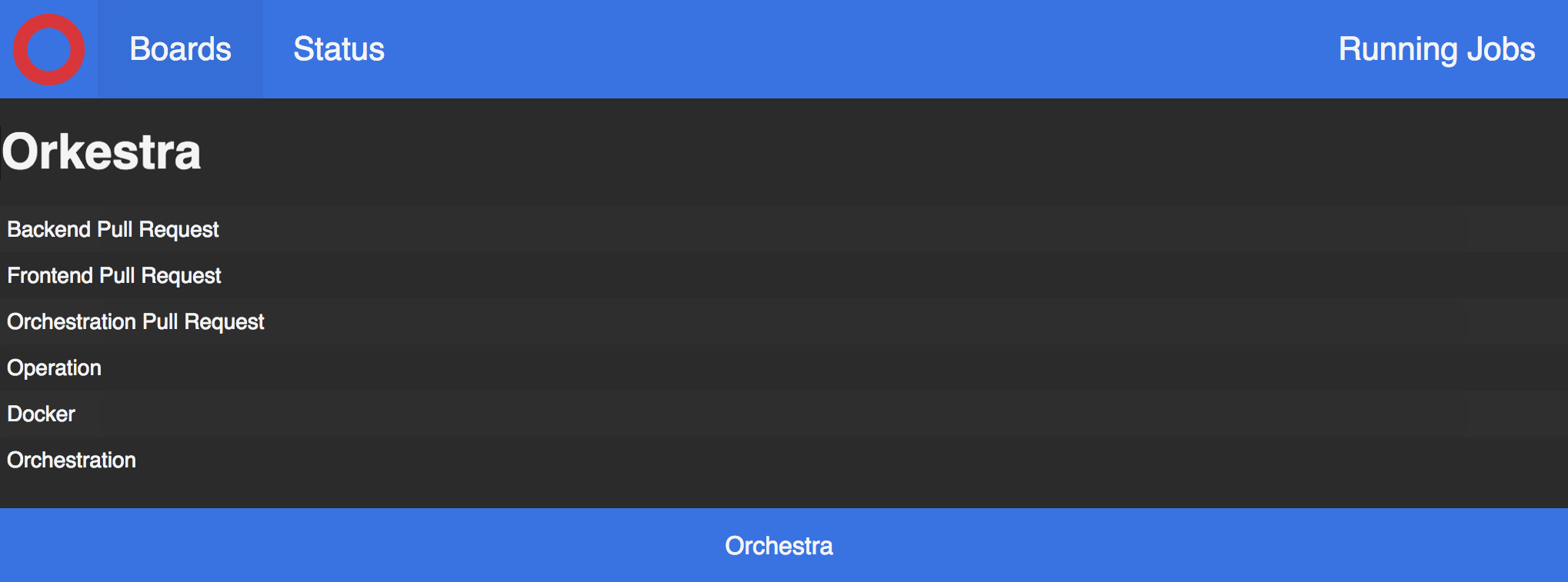Orkestra is an Open Source Continuous Integration / Continuous Deployment server as a library running on
Kubernetes.
It leverages Kubernetes concepts such as Jobs or Secrets, and configuration as code in Scala
to take the most of compile time type safety and compatibility with Scala or Java libraries.
Key features:
- Configured completely via code which can be version controlled
- Fully scalable
- Highly Available
- Extendable via any Scala/Java libraries
project/plugins.sbt:
addSbtPlugin("tech.orkestra" % "sbt-orkestra" % "<latest version>")build.sbt:
lazy val orkestra = orkestraProject("orkestra", file("orkestra"))
.settings(
libraryDependencies ++= Seq(
"tech.orkestra" %%% "orkestra-github" % orkestraVersion, // Optional Github plugin
"tech.orkestra" %%% "orkestra-cron" % orkestraVersion, // Optional Cron plugin
"tech.orkestra" %% "orkestra-lock" % orkestraVersion // Optional Lock plugin
)
)Given the above installation, here is a minimal project with one job:
orkestra/src/main/scala/orkestra.scala:
import tech.orkestra._
import tech.orkestra.Dsl._
import tech.orkestra.board._
import tech.orkestra.job._
import tech.orkestra.model._
// We extend OrkestraServer to create the web server
object Orkestra extends OrkestraServer {
// Configuring the UI
lazy val board = deployFrontendJobBoard
// Configuring the jobs
lazy val jobs = Set(deployFrontendJob)
// Creating the job and configuring UI related settings
lazy val deployFrontendJobBoard = JobBoard[() => Unit](JobId("deployFrontend"), "Deploy Frontend")()
// Creating the job from the above definition (this will be compiled to JVM)
lazy val deployFrontendJob = Job(deployFrontendJobBoard) { implicit workDir => () =>
println("Deploying Frontend")
}
}
This example is described in Jobs & Boards.
We provide some basic Kubernetes Deployment in kubernetes-dev
that you can use to deploy on a dev environment.
Assuming that you are in one of the example projects
(or in your own project), here is how to deploy on Kubernetes with Minikube:
minikube start --memory 4096 # Start Minikube
eval `minikube docker-env` # Make docker use the docker engine of Minikube
sbt orkestraJVM/Docker/publishLocal # Publish the docker artifact
kubectl apply -f ../kubernetes-dev # Apply the deployment to Kubernetes
kubectl proxy # Proxy the Kubernetes api
Visit Orkestra on http://127.0.0.1:8001/api/v1/namespaces/orkestra/services/orkestra:http/proxy.
You can troubleshoot any deployment issue with minikube dashboard.
More on how to configure the deployment in Config.
Find all the documentation on https://orkestra.tech:
- Jobs & Boards
- Config
- Parameters
- Stages
- Shell scripts
- Directories
- Secrets
- Triggering jobs
- RunId
- Containers
- Plugins
Talks and articles:
- Functional DevOps with Scala and Kubernetes article from Joan Goyeau
- Functional DevOps with Scala and Kubernetes talk from Joan Goyeau
Orkestra has been created at DriveTribe by its Scala backend team that had to do DevOps. Obsessed by functional programming they decided to apply the same paradigm to their DevOps.
Contributions to Orkestra are more than welcomed! See CONTRIBUTING.md for all the information and getting help.



